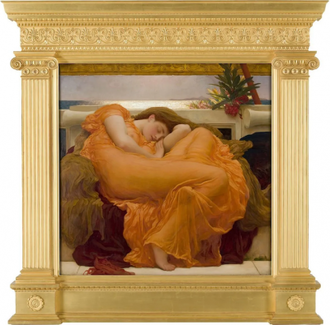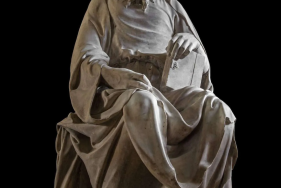Gospel in Art: You must come away and rest

Flaming June, by Lord Leighton PRA, 1895 © Museo de Arte de Ponce, Puerto Rico; The Luis A Ferré Foundation, Inc.
Source: Christian Art
Gospel of 21 July 2024
Mark 6:30-34
The apostles rejoined Jesus and told him all they had done and taught. Then he said to them, 'You must come away to some lonely place all by yourselves and rest for a while'; for there were so many coming and going that the apostles had no time even to eat. So they went off in a boat to a lonely place where they could be by themselves. But people saw them going, and many could guess where; and from every town they all hurried to the place on foot and reached it before them. So as he stepped ashore he saw a large crowd; and he took pity on them because they were like sheep without a shepherd, and he set himself to teach them at some length.
Reflection on the painting
Today's Gospel reading highlights the importance Jesus placed on rest. After a period of intense mission work, Jesus led his disciples to a secluded place to rest. Despite the abundance of work that awaited them, Jesus knew that taking time to step back from their duties was essential. Our lives too should be more than just constant labour. In fact, the value of rest is emphasised from the very beginning of the Bible. In the first chapter of Genesis, we read that God rested on the seventh day after creating the world in six days. As beings made in God's image, we need periods of rest alongside our work. Rest allows us to reflect, appreciate our blessings, and observe God's work in our lives. Being too busy all the time will make us lose sight of God.
Flaming June, painted by Frederic, Lord Leighton in 1895, is a quintessential example of Victorian neoclassical art. The painting depicts a beautiful young woman, draped in a vibrant, semi-transparent orange gown, asleep on a marble bench by the sea. She has come away to a lonely place to rest. Her serene pose and the meticulous rendering of the folds of her dress capture a dream-like quality. The brilliance of the orange gown contrasts sharply with the cool marble background and the deep blue sea. The laurel leaves that frame her head suggest a classical reference to ancient classical Greece, reinforcing the timeless quality of the scene.
The representation of "Flaming June" goes beyond mere aesthetics; it embodies the Victorian ideal of beauty and femininity. The exact inspiration for the painting remains a subject of speculation, but it is widely believed that Leighton intended to capture the fleeting beauty of a moment of rest, frozen in time. The theme of sleep, often associated with death in art history, underscores the transient nature of existence. The peaceful, almost death-like slumber of the woman can be interpreted as a metaphor for the temporary nature of beauty and life itself.
LINKS
Gospel in Art: https://christian.art/
Today's Reflection: https://christian.art/daily-gospel-reading/mark-6-30-34-2024-2/


















